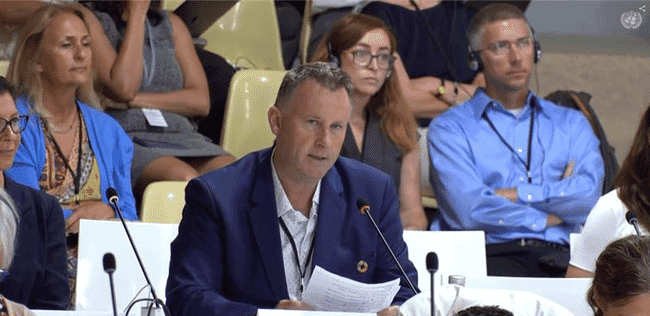
© UN
“Oceans unite us,” declared Bertrand Charron, ASC global research and insights director, reflecting on a week participating at the UNOC in Nice. “They offer a future full of opportunity – if we act now. To transform food systems and protect biodiversity, we need transparency, engagement, and credible, publicly-available performance data. With the right partnerships and finance, aquaculture can play a major role in food security and a sustainable, equitable ocean future.”
ASC’s participation at UNOC was pivotal, culminating in Charron’s invitation to address the UN Ocean Action Panel 9. Representing ASC and Sustainable Fisheries Partnership (SFP), he championed sustainable ocean food as a solution to poverty and hunger, highlighting a collaborative initiative in India as a model for integrated, multi-stakeholder solutions.
At the Blue Economy and Finance Forum (BEFF), which brought together government, finance and philanthropy to accelerate sustainable ocean investment, Charron noted, “A key takeaway from BEFF was the urgent need for robust data to inform decision-making. Transparency builds trust - and trust drives investment.” said Charron, in a press release.
A consistent message resonated across UNOC: the urgent need to scale blue finance. Investors are poised to act, but demand reliable ESG data and metrics to assess risk and impact. This is where ASC contributes through its work on standards and certification.
ASC’s global certification programme provides verified performance data on aquaculture’s social and environmental impacts, supporting traceability, credible sustainability reporting, and de-risking investment. This crucial role is increasingly recognised and referenced by key global organisations including the World Bank and in initiatives such as the Ocean Investment Protocol (OIP). Other examples include the Taskforce on Nature-related Financial Disclosures (TNFD) and Science Based Targets Network (SBTN).
“The OIP is a landmark in ocean finance. It offers critical guidance to unlock sustainable investment—and ASC is ready to support it with the data, insight, and systems investors need to build trust in the blue economy,” explained Charron.
As the ASC programme is science-based, Ola Luthman, ASC climate change coordinator, attended the One Oceans Science Congress the week before UNOC. Ola said, “Whilst aquaculture was under-represented and key voices such as aquaculture producers and the fishing industry were missing, the conference recognised that aquaculture, if done with careful ecosystem integration, can play a much bigger role in climate adaptation and coastal resilience. The conference emphasised that governance structures, across fisheries, Marine Protected Areas, and coastal ecosystems, need to evolve beyond top-down policies. This is directly relevant for aquaculture, which often faces fragmented governance and conflict over resources.”
ASC’s participation at UNOC highlighted the growing recognition of responsible aquaculture as a key component of ocean stewardship. As momentum builds around blue finance and sustainable food systems, continued collaboration and transparency will be essential to driving progress.


